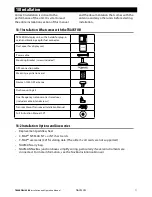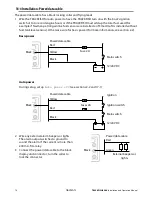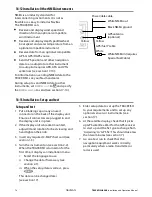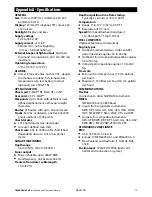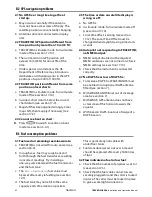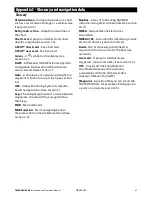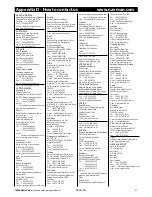
TRACKFISH 6500
Installation and Operation Manual
78
NAVMAN
Yellow
18-12 Installation: Other NMEA instruments
NMEA is an industry standard for
interconnecting instruments. It is not as
flexible or as easy to install as NavBus.
The TRACKFISH can:
Receive and display wind speed and
direction from an optional compatible
wind instrument.
Receive and display depth, paddlewheel
boat speed and water temperature from an
optional compatible instrument.
Receive data from an optional compatible
GPS or GPS/DGPS source.
Send GPS position and other navigation
data to an autopilot or other instrument.
An autopilot requires APB, APA and VTG
sentences (see section 17-10).
For information on sending NMEA data to the
TRACKFISH, see your Navman dealer.
During setup to send NMEA data to other
instruments, set
NMEA out
to and specify
the
NMEA data
to send (see section 17-10).
White NMEA out
Black NMEA ground
GPS antenna
(optional)
White NMEA in (requires
Special Fuel Cable)
Yellow
Power/data cable
Yellow
GPS/fuel Y cable
White
Setup and test
1 Put a blanking cap on any unused
connector on the back of the display unit.
Ensure all connectors are plugged in and
the display unit is in place.
2 If the display unit is bracket mounted,
adjust tilt and rotation for best viewing and
hand tighten the knob.
3 Insert any required C-MAP chart card (see
section 1-3).
4 Turn the instrument on (see section 2-2).
When the TRACKFISH is turned on for the
first time, it displays an installation menu:
i
Select the language to use.
ii Change the data if necessary (see
section 2-1)
iii When the setup data is correct, press
.
This data can be changed later
(see section 17).
18-13 Installation: Setup and test
5 Enter setup data to set up the TRACKFISH
to your requirements and to set up any
optional sensors or instruments (see
section 17).
6 At the satellite display, check that it picks
up GPS satellites. Wait for the GPS receiver
to start up and the fix type to change from
‘Acquiring’ to ‘GPS fix’. This should take less
than two minutes (see section 7).
7 Go on a test run to check that the
navigation equipment works correctly,
particularly when a radio transmitter or
radar is used.








